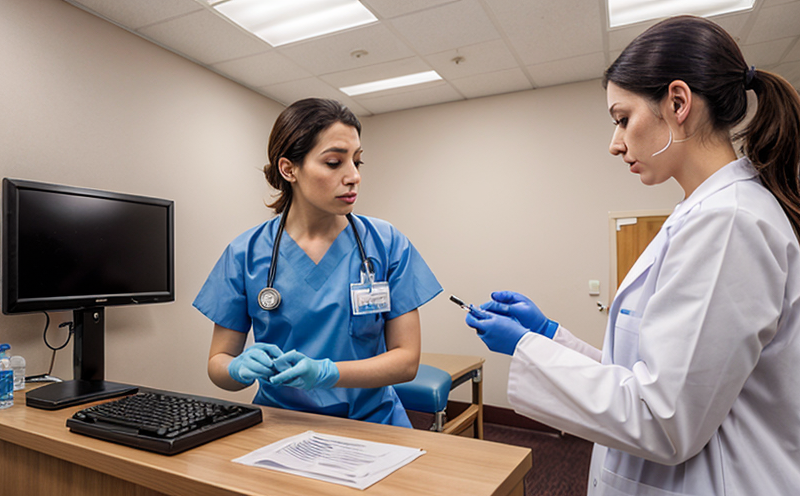Mycotoxin Screening in Grain and Cereal Products
Mycotoxins are toxic metabolites produced by certain fungi that can contaminate grains, cereals, and other agricultural products. These toxins pose significant health risks to humans and animals when consumed. In the context of clinical healthcare testing, mycotoxin screening in grain and cereal products is crucial for ensuring food safety and regulatory compliance.
The presence of mycotoxins like aflatoxin, zearalenone, trichothecenes, and fumonisins can lead to various health issues, including liver damage, reproductive disorders, and immune system suppression. Therefore, accurate and reliable detection methods are essential for protecting public health.
At Eurolab, we offer comprehensive mycotoxin screening services using advanced analytical techniques that adhere to international standards such as ISO 17025 and EU Directive 2002/657/EC. Our testing methods comply with the latest European Union legislation on maximum levels of mycotoxins in foodstuffs.
The process begins with the collection of representative samples from various batches or lots of grain and cereal products. These samples are then processed according to standardized procedures to extract mycotoxins effectively. After extraction, the samples undergo quantitative analysis using high-performance liquid chromatography (HPLC) coupled with mass spectrometry (MS).
The HPLC-MS system allows us to achieve high sensitivity and specificity in detecting even trace amounts of mycotoxins. This ensures that we can provide accurate results that help our clients meet regulatory requirements.
Our laboratory uses validated methods based on international standards, including the European Commission's Official Method for Mycotoxin Analysis (EC Official Methods). We also follow guidelines from the World Health Organization (WHO) and Food and Agriculture Organization of the United Nations (FAO).
The results are reported in accordance with these standards, providing clear guidance on whether the levels detected exceed acceptable limits. This information is vital for decision-making processes regarding product release or potential recalls.
Our team of experts ensures that every step from sample collection to final report generation adheres strictly to best practices outlined by relevant authorities worldwide. By leveraging cutting-edge technology and rigorous quality control measures, Eurolab guarantees accurate and timely results that contribute significantly towards maintaining high standards in clinical healthcare.
Scope and Methodology
Our mycotoxin screening services cover a wide range of grain and cereal products, including wheat, corn, oats, barley, rye, and other related items. We analyze these materials for various types of mycotoxins known to pose risks in food production.
The analytical techniques used include liquid chromatography with tandem mass spectrometry (LC-MS/MS), which is highly sensitive and selective for detecting multiple mycotoxins simultaneously. Additionally, we employ immunoaffinity columns to concentrate target compounds before analysis, enhancing both detection limits and precision.
For each type of cereal or grain tested, specific thresholds apply based on international regulations. Our tests follow these guidelines rigorously to ensure compliance with local laws and international standards.
We provide detailed reports for every sample analyzed, including quantification data for all detected mycotoxins along with comparison against applicable limits. These reports serve as crucial documents for quality assurance programs and regulatory submissions.
Eurolab Advantages
Eurolab stands out among other laboratories due to its commitment to excellence in every aspect of mycotoxin screening. With state-of-the-art facilities and experienced professionals, we ensure accurate results consistently.
Our ISO 17025 accreditation guarantees adherence to internationally recognized standards for proficiency testing programs. This certification demonstrates our capability to deliver reliable test outcomes across diverse applications within the food industry.
We maintain strict quality assurance protocols throughout all stages of sample handling, preparation, and analysis. Our laboratory environment is controlled rigorously to minimize contamination risks, ensuring robust results that meet stringent expectations set by regulatory bodies around the globe.
By choosing Eurolab for your mycotoxin screening needs, you gain access to unparalleled expertise in this field. Our multidisciplinary team comprises scientists with extensive experience in toxicology, analytical chemistry, and related disciplines who work closely together to provide comprehensive solutions tailored specifically to meet individual client requirements.
International Acceptance and Recognition
Eurolab's mycotoxin screening services are widely accepted internationally due to our stringent adherence to global standards. Our reports are recognized by numerous regulatory bodies including the European Commission, WHO, FAO, and others.
Compliance with international standards ensures that our findings hold credibility across borders, making them valuable for export markets as well as domestic operations. Many countries have adopted these same limits into their own national laws, further validating Eurolab's approach to mycotoxin testing.
Recognizing the importance of harmonization in regulatory frameworks, Eurolab actively participates in collaborative initiatives aimed at standardizing methods and criteria for detecting harmful substances like mycotoxins. This proactive stance reflects our dedication to supporting international efforts towards safer food supplies.





